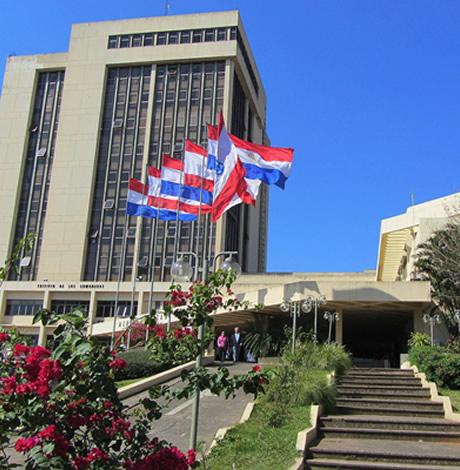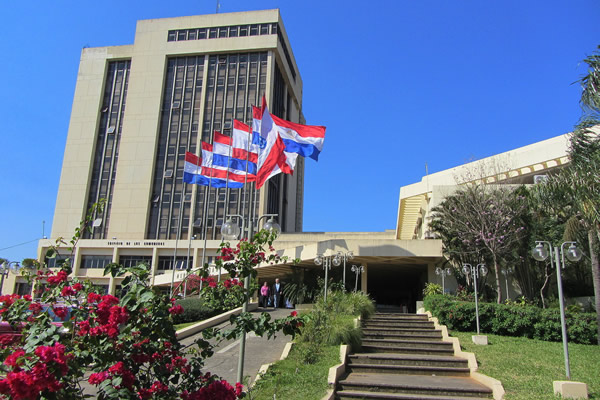News
Paraguayan police clash with LGBT advocates
At least 10 injured during protest ahead of OAS meeting


Paraguayan police on Monday clashed with LGBT rights advocates who protested in the South American country’s capital. (Photo by Felipe Mendez; courtesy Creative Commons)
Officers with the Paraguayan National Police clashed with members of Somosgay and Lesvos — two LGBT advocacy organizations in the landlocked South American country — in Asunción as they protested President Horacio Cartés’ decision to oppose a proposed OAS declaration that would have indicated support of “diverse families.”
A video that Somosgay posted to YouTube shows protesters waiving rainbow flags before police in riot gear approached and struck some of them with batons. The clip also shows two journalists who appear to have been injured during the confrontation.
Sergio López of Somosgay told the Washington Blade during a Skype interview from Asunción on Monday that a pregnant woman was among those injured.
“We suffered repression by the national police,” said López.
The clashes took place as a much larger group of anti-gay protesters gathered outside the hotel where the three-day OAS meeting began on Tuesday under the banner “development through social inclusion.”
A police spokesperson acknowledged to a Paraguayan radio station that clashes took place between the officers who were protecting the anti-gay protesters and the LGBT rights advocates. He said members of Somosgay and Lesvos provoked the officers to respond.
“Some 60 gay people appeared out of nowhere,” said the spokesperson as Hoy, a Paraguayan newspaper, reported. “We spoke with them, they understood, they passed and we again asked them to disperse but they did not want to do so. We insisted a lot, spoke with them a lot, we then sent in a platoon to divide them, but they became aggressive when the blue helmets (riot police) came.”
López described the protest to the Blade as “peaceful.”
Caribe Afirmativo, a Colombian LGBT advocacy group whose members are attending the OAS meeting in the Paraguayan capital, was quick to condemn the police.
“Caribe Afirmativo rejects the attacks by the police who victimized our colleagues with the organization Somosgay of Paraguay a few hours ago,” said the group on its Facebook page. “They were protesting in a peaceful way in front of the venue where we are meeting.”
Esteban Paulón, president of the LGBT Federation of Argentina, told the Blade that a member of his organization is attending the OAS meeting in Asunción. It remains unclear whether she attended the protest.
“We emphatically reject these acts of homophobic violence in Paraguay,” Paulón told the Blade.
LGBT Paraguayans lack basic legal protections found in neighboring Argentina and other South American countries.
López and Somosgay CEO Simón Cazal petitioned a Paraguayan judge to register their Argentina marriage, but she denied their request last year.
Somosgay in 2013 opened Paraguay’s first men’s health clinic in Asunción, but Cazal told the Blade the landlocked South American country has limited resources to combat HIV/AIDS among at-risk groups. Discrimination and violence against trans Paraguayans remains pervasive.
An OAS spokesperson declined to comment on the clashes.
A member of an anti-LGBT group earlier on Tuesday posted a picture to Facebook from a forum that said “groups from the gay and abortion lobby attack and offend while our life and family delegation presents our document.” López told the Blade that he and other advocates had planned to meet with officials to discuss the protest.
The OAS adopted an anti-discrimination resolution that includes sexual orientation and gender identity and expression during its 2013 meeting that took place in Guatemala.
Caribe Afirmativo called upon the OAS to condemn the clashes between police and protesters. The group also urged the Paraguayan government to punish the officers who were involved.
“Unfortunately the Paraguay of President Cartés casts a negative light over a continent that wants to advance towards more equality,” said Paulón. “We clearly support the organizations Somosgay and Lesvos and we commit our resources to built together with them an egalitarian Latin America.”
State Department
State Department releases annual human rights report
Antony Blinken reiterates criticism of Uganda’s Anti-Homosexuality Act

Secretary of State Antony Blinken on Monday once again reiterated his criticism of Uganda’s Anti-Homosexuality Act upon release of the State Department’s annual human rights report.
“This year’s report also captures human rights abuses against members of vulnerable communities,” he told reporters. “In Afghanistan, the Taliban have limited work opportunities for women, shuttered institutions found educating girls, and increasing floggings for women and men accused of, quote, ‘immoral behavior,’ end quote. Uganda passed a draconian and discriminatory Anti-Homosexuality Act, threatening LGBTQI+ individuals with life imprisonment, even death, simply for being with the person they loved.”
Ugandan President Yoweri Museveni last May signed the law, which contains a death penalty provision for “aggravated homosexuality.”
The U.S. subsequently imposed visa restrictions on Ugandan officials and removed the country from a program that allows sub-Saharan African countries to trade duty-free with the U.S. The World Bank Group also announced the suspension of new loans to Uganda.
Uganda’s Constitutional Court earlier this month refused to “nullify the Anti-Homosexuality Act in its totality.” More than a dozen Ugandan LGBTQ activists have appealed the ruling.
Clare Byarugaba of Chapter Four Uganda, a Ugandan LGBTQ rights group, on Monday met with National Security Council Chief-of-Staff Curtis Ried. Jay Gilliam, the senior LGBTQI+ coordinator for the U.S. Agency for International Development, in February traveled to Uganda and met with LGBTQ activists who discussed the Anti-Homosexuality Act’s impact.
“LGBTQI+ activists reported police arrested numerous individuals on the basis of their sexual orientation or gender identity and subjected many to forced anal exams, a medically discredited practice with no evidentiary value that was considered a form of cruel, inhuman, and degrading treatment and could amount to torture,” reads the human rights report.
The report, among other things, also notes Ugandan human rights activists “reported numerous instances of state and non-state actor violence and harassment against LGBTQI+ persons and noted authorities did not adequately investigate the cases.”
Report highlights anti-LGBTQ crackdowns in Ghana, Hungary, Russia
Ghanaian lawmakers on Feb. 28 approved the Promotion of Proper Human Sexual Rights and Ghanaian Family Values Bill. The country’s president, Nana Akufo-Addo, has said he will not sign the measure until the Ghanaian Supreme Court rules on whether it is constitutional or not.
The human rights report notes “laws criminalizing consensual same-sex sexual conduct between adults” and “crimes involving violence or threats of violence targeting lesbian, gay, bisexual, transgender, queer or intersex persons” are among the “significant human rights issues” in Ghana.
The report documents Hungarian Prime Minister Viktor Orbán and members of his right-wing Fidesz party’s continued rhetoric against “gender ideology.” It also notes Russia’s ongoing crackdown against LGBTQ people that includes reports of “state actors committed violence against LGBTQI+ individuals based on their sexual orientation or gender identity, particularly in Chechnya.”
The report specifically notes Russian President Vladimir Putin on July 24 signed a law that bans “legal gender recognition, medical interventions aimed at changing the sex of a person, and gender-affirming care.” It also points out Papua New Guinea is among the countries in which consensual same-sex sexual relations remain criminalized.

The Cook Islands and Mauritius in decriminalized homosexuality in 2023.
The report notes the Namibia Supreme Court last May ruled the country must recognize same-sex marriages legally performed outside the country. The report also highlights the Indian Supreme Court’s ruling against marriage equality that it issued last October. (It later announced it would consider an appeal of the decision.)
Congress requires the State Department to release a human rights report each year.
The Biden-Harris administration in 2021 released a memorandum that committed the U.S. to promoting LGBTQ+ and intersex rights abroad.
The full report can be read here.

Dominica’s High Court of Justice on Monday struck down provisions of a law that criminalized consensual same-sex sexual relations.
A gay man who remains anonymous in 2019 challenged sections of the country’s Sexual Offenses Act that criminalized anal sex and “gross indecency” with up to 10 years and 12 years in prison respectively. The plaintiff argued the provisions violated his constitutional rights.
The Dominica Equality and Sexual Expression Association and the Eastern Caribbean Alliance for Diversity and Equality, a group that advocates for LGBTQ and intersex rights in the region, in a press release noted the court in its ruling affirmed “the criminalization of consensual same-sex activity between adults is unconstitutional.” The groups added Justice Kimberly Cenac-Phulgence “declared that the laws commonly known as buggery and gross indecency laws, contravenes the constitution of the Commonwealth of Dominica, namely the right to liberty, freedom of expression, and protection of personal privacy.”
“It is long past time that the dignity and dreams of all Dominicans were recognized,” said DESEA Executive Director Sylvester Jno Baptiste in the press release. “We are all God’s children, and he loves us all equally. Laws that treat some Dominicans as less than others, have no place in a just society.”
Dominica is a former British colony that is located between Guadeloupe and Martinique in the Lesser Antilles.
Antigua and Barbuda, St. Kitts and Nevis, Barbados, and Trinidad and Tobago in recent years have decriminalized consensual same-sex sexual relations.
The Inter-American Commission on Human Rights in 2021 issued a decision that said Jamaica must repeal its colonial-era sodomy law. The country’s Supreme Court last year ruled against a gay man who challenged it.
A judge on St. Vincent and the Grenadines’s top court in February dismissed two cases that challenged the country’s sodomy laws.
“Decriminalization helps create an environment where LGBTQ individuals can live openly without fear of persecution, enabling them to access health care, education, and employment without facing discrimination,” said Outright Executive Director Maria Sjödin on Monday in response to the Dominica ruling. “The repeal of these discriminatory laws is a testament to the tireless efforts of activists, advocates, and allies who have long fought for justice and equality. It is a victory for human rights and a significant milestone in the ongoing struggle for LGBTQ rights in the Caribbean.”
Politics
Smithsonian staff concerned about future of LGBTQ programming amid GOP scrutiny
Secretary Lonnie Bunch says ‘LGBTQ+ content is welcome’

Staff at the Smithsonian Institution are concerned about the future of LGBTQ programming as several events featuring a drag performer were cancelled or postponed following scrutiny by House Republicans, according to emails reviewed by the Washington Post.
In December, Secretary Lonnie G. Bunch III appeared before a hearing led by GOP members of the Committee on House Administration, who flagged concerns about the Smithsonian’s involvement in “the Left’s indoctrination of our children.”
Under questioning from U.S. Rep. Stephanie Bice (R-Okla.), Bunch said he was “surprised” to learn the Smithsonian had hosted six drag events over the past three years, telling the lawmakers “It’s not appropriate to expose children” to these performances.
Collaborations with drag artist Pattie Gonia in December, January, and March were subsequently postponed or cancelled, the Post reported on Saturday, adding that a Smithsonian spokesperson blamed “budgetary constraints and other resource issues” and the museums are still developing programming for Pride month in June.
“I, along with all senior leaders, take seriously the concerns expressed by staff and will continue to do so,” Bunch said in a statement to the paper. “As we have reiterated, LGBTQ+ content is welcome at the Smithsonian.”
The secretary sent an email on Friday expressing plans to meet with leaders of the Smithsonian Pride Alliance, one of the two groups that detailed their concerns to him following December’s hearing.
Bunch told the Pride Alliance in January that with his response to Bice’s question, his intention was to “immediately stress that the Smithsonian does not expose children to inappropriate content.”
“A hearing setting does not give you ample time to expand,” he said, adding that with more time he would have spoken “more broadly about the merits and goals of our programming and content development and how we equip parents to make choices about what content their children experience.”
-

 District of Columbia5 days ago
District of Columbia5 days agoNew D.C. LGBTQ+ bar Crush set to open April 19
-

 South America3 days ago
South America3 days agoDaniel Zamudio murderer’s parole request denied
-

 Maryland4 days ago
Maryland4 days agoMontgomery County police chief discusses arrest of trans student charged with planned school shooting
-

 Movies5 days ago
Movies5 days agoAfter 25 years, a forgotten queer classic reemerges in 4K glory










